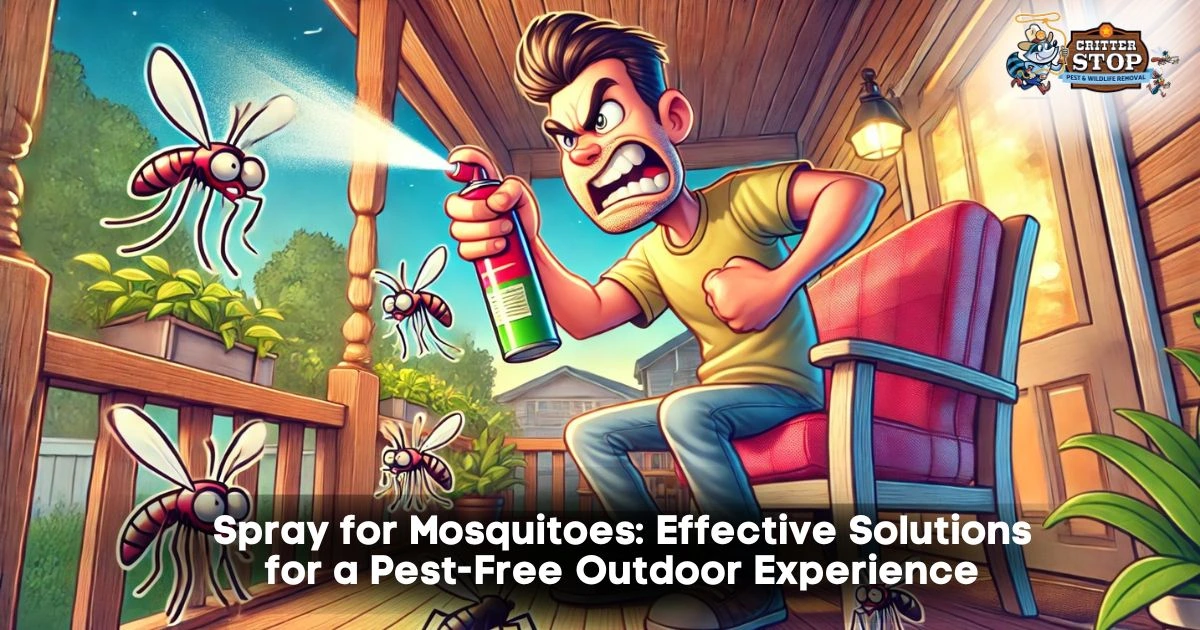
With warmer weather comes the increased presence of mosquitoes, making outdoor activities less enjoyable. Using an effective spray for mosquitoes can significantly reduce the annoyance of these pests and minimize the risk of mosquito-borne diseases. Knowing which products work best and how to apply them can make a big difference in creating a mosquito-free environment.
Different mosquito sprays are available, ranging from chemical repellents to natural options. Each type has its benefits and drawbacks, catering to various needs and preferences. Understanding the various formulations can help individuals choose the right spray.
In addition to personal use, there are options for treating outdoor spaces enhancing protection against mosquito infestations. Exploring these various methods protects individuals and can create a more enjoyable outdoor experience for families and guests alike.
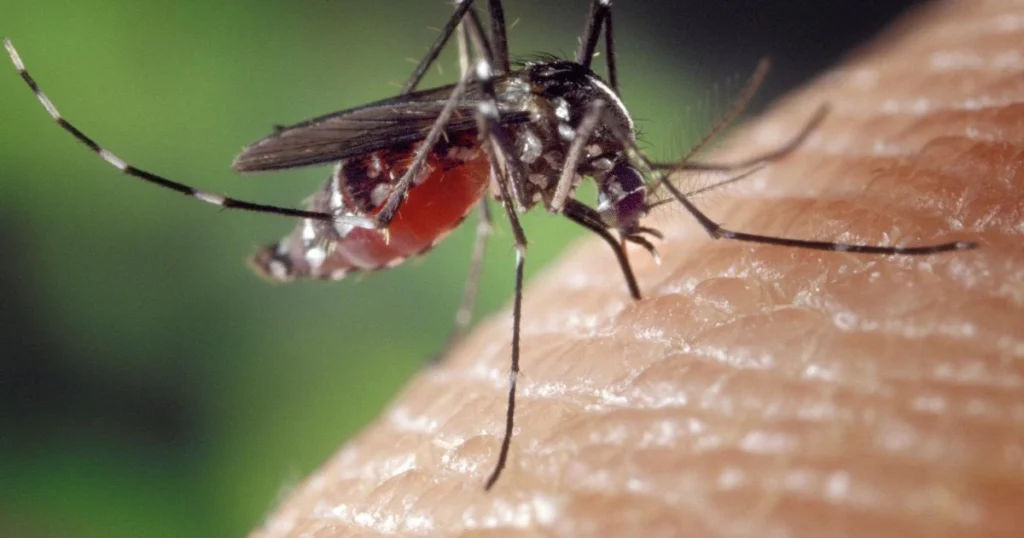
Mosquito repellents come in various formulations, each effectively targeting mosquito populations. Understanding their types and effectiveness helps choose the right spray for various situations.
There are primarily two categories of mosquito sprays: repellents and insecticides.
When selecting a product, individuals should consider factors such as the area of use—whether on skin or in outdoor environments—and the desired duration of effectiveness.
The effectiveness of mosquito sprays largely depends on their formulation and intended use.
Users should also know that environmental conditions, such as humidity and wind, can affect efficacy. Therefore, choosing the right spray to get rid of mosquitoes effectively is essential.

Chemical-based mosquito sprays are designed to provide effective protection against mosquitoes and other biting insects. When used correctly, most of these products contain specific active ingredients that target pests while ensuring safety for humans and pets.
Permethrin is a synthetic chemical similar to pyrethrin derived from chrysanthemum flowers. This repellant is particularly effective for treating clothing, gear, and outdoor equipment rather than directly applying it to the skin.
Key Benefits:
Applications can include treating camping gear, tents, and clothing. For safe use, it is important to follow product instructions closely. A popular choice for outdoor enthusiasts, permethrin provides lasting protection against mosquitoes and is often included in the best bug spray for ticks and mosquitoes.
DEET (N,N-diethyl-meta-toluamide) is one of mosquito repellents' most common active ingredients. It offers reliable, long-lasting protection, making it suitable for high-risk areas and situations.
Key Features:
Users appreciate DEET's ease of use in spray forms, making application straightforward. It is essential to apply it evenly and avoid sensitive areas like the eyes and mouth. While DEET is effective, some may prefer alternatives due to skin reactions or odors. Individuals can significantly reduce mosquito bites during outdoor activities using DEET-based sprays.
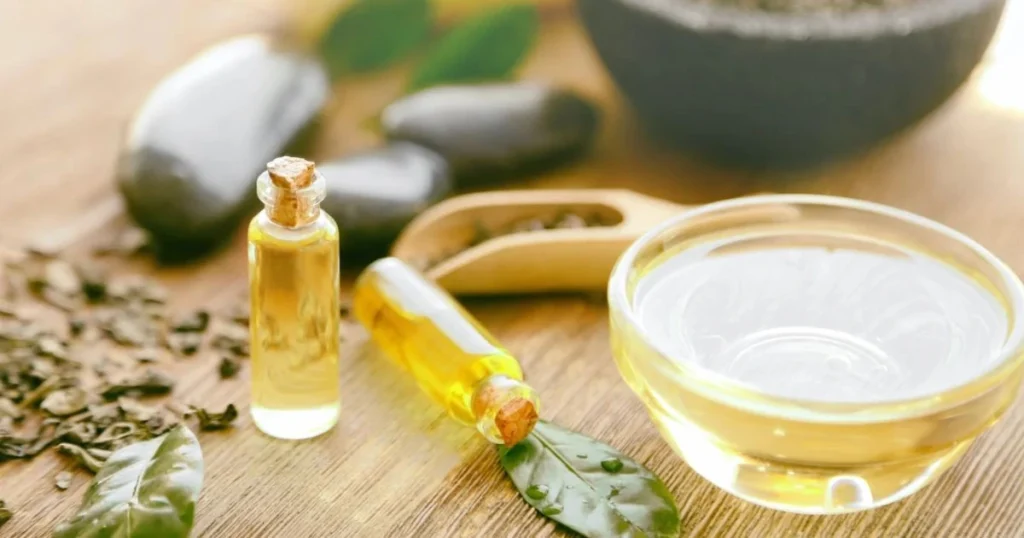
Natural repellent options are popular for those seeking effective ways to keep mosquitoes at bay without synthetic chemicals. Essential oils and DIY sprays are two effective methods that can help provide protection.
Essential oil sprays are derived from natural plant substances, making them a preferred choice for many. Common oils used in these sprays include citronella, lemongrass, lavender, and peppermint.
To create an essential oil spray for mosquitoes, combine a few drops of essential oils with a carrier oil or water in a spray bottle. For instance, 10-15 drops of citronella oil and two tablespoons of witch hazel in 4 ounces of water work well. This formulation provides a pleasant scent and can effectively deter mosquitoes.
Creating a DIY spray for mosquitoes allows for customization based on personal preference. Effective recipes often incorporate natural ingredients that repel mosquitoes while being safe for the skin.
One simple formula involves mixing apple cider vinegar, water, and essential oils. For example, combining one part apple cider vinegar with one part water and adding 10-20 drops of essential oils creates a potent mixture.
Another option is to use witch hazel combined with essential oils for a lighter spray. Always apply any DIY spray to a small patch of skin first to test for reactions.
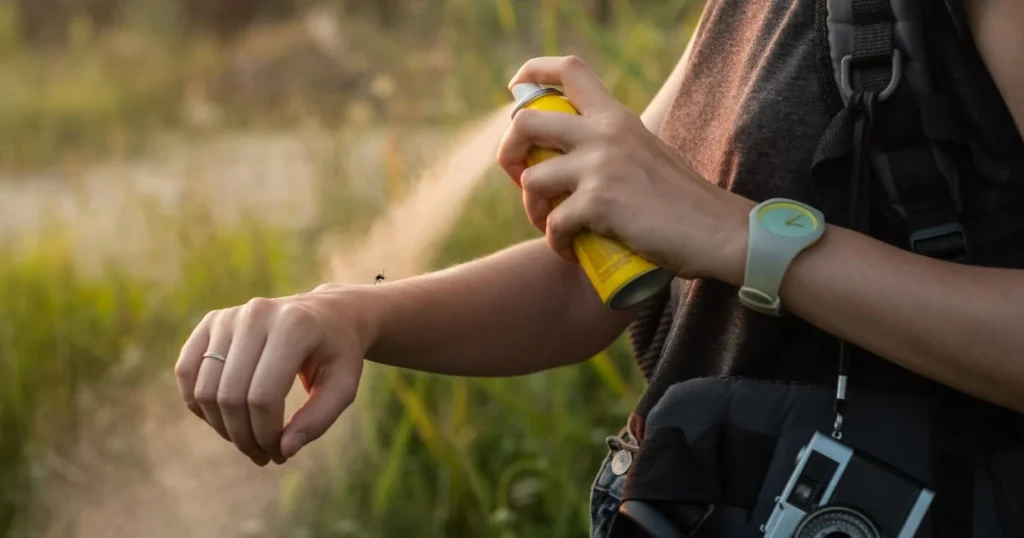
Proper application of mosquito sprays ensures effectiveness while prioritizing health and safety. Understanding how to apply these products safely is crucial, especially for sensitive populations.
When applying mosquito sprays, it is important to follow the manufacturer's instructions for optimal results. Sprays containing DEET, picaridin, or lemon eucalyptus oil are generally effective for killing or repelling mosquitoes.
For skin application, spray evenly over exposed skin without saturating it. Hold the can 6-8 inches away from the skin or clothing. Avoid contact with the eyes and mouth.
For outdoor areas, focus on potential breeding grounds like standing water. For larger spaces, use a backpack sprayer or garden sprayer. Always reapply the spray after swimming or sweating, as effectiveness diminishes when wet.
Extra care is necessary when using mosquito sprays around children and sensitive individuals. Selected mosquito repellents should have lower concentrations of active ingredients.
Avoid using sprays directly on children’s skin, especially those under two months. Instead, apply repellents to clothing and gear. Cover infants with long sleeves and pants, and use mosquito nets when necessary.
For people with skin sensitivities or allergies, conducting a patch test on a small skin area is advisable before full application. Always consult healthcare providers before using mosquito sprays on individuals with health conditions or during pregnancy.
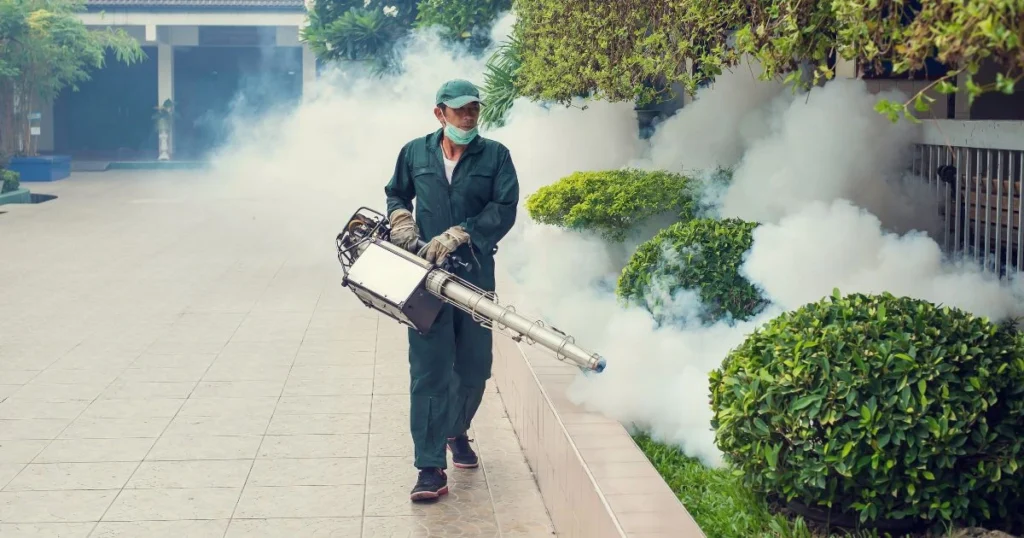
Effective mosquito control in outdoor spaces involves tailored spraying techniques for various environments, such as backyards and large areas. Understanding the appropriate methods can help create a more enjoyable outdoor experience.
When spraying backyards for mosquitoes, targeting the right areas is essential. Focus on areas with standing water, as these are prime breeding grounds. Use a high-quality bug spray for ticks and mosquitoes to ensure comprehensive coverage.
Application Tips:
Check for any local regulations about chemicals used in backyard spraying to ensure safety and compliance.
Professional-grade mosquito treatments might be necessary for larger areas like parks or extensive gardens. These often include commercial-grade sprayers that distribute pesticides effectively.
Key Considerations:
Regular treatments can drastically reduce mosquito populations, enhancing outdoor comfort. For ongoing wildlife or pest challenges, consider contacting Critter Stop at (214) 234-2616 for a free inspection. Critter Stop has a fantastic reputation and some of the best customer reviews for providing high-quality work and great service.
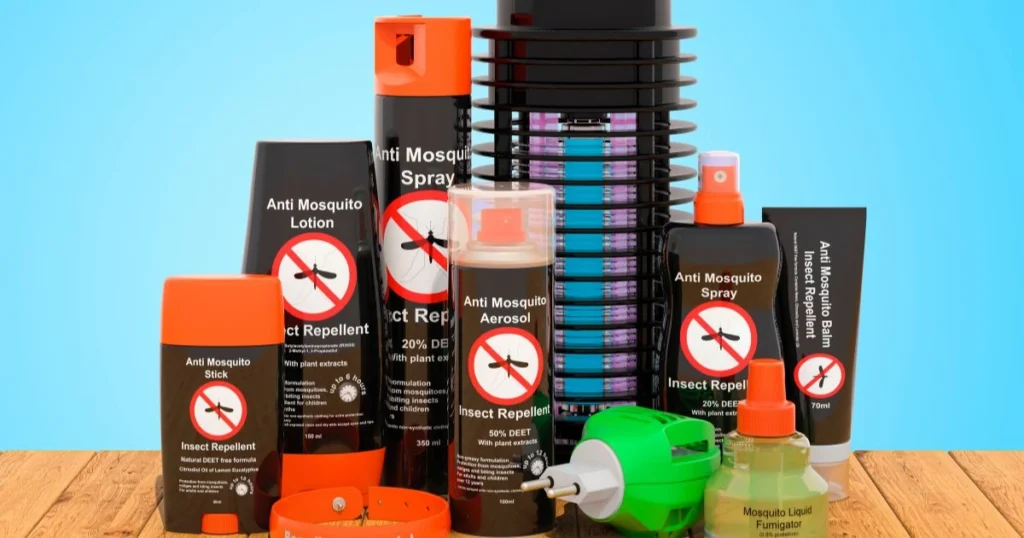
Various factors influence the effectiveness of mosquito sprays, including their active ingredients and application techniques. The following questions provide insights into effectively choosing, using, and understanding mosquito sprays.
For outdoor gatherings, sprays with DEET, picaridin, or oil of lemon eucalyptus are often considered the best options. These ingredients provide effective protection against mosquitoes for several hours. They are reliable for keeping pests at bay during parties or family events in gardens or parks.
Picaridin and DEET are the most researched active ingredients known for their effectiveness against mosquitoes. Picaridin is odorless and less greasy, making it appealing to many users. DEET has been a long-standing choice, providing proven results when applied correctly and at the recommended concentrations.
Sprays containing 25-30% DEET are highly effective in humid conditions. Humidity can increase mosquito activity, so stronger formulations are recommended. Additionally, products with lemon eucalyptus oil can also provide good results in humid climates, offering an alternative to traditional chemical repellents.
To effectively spray mosquitoes in a backyard, covering all areas, including under bushes and around lounging areas, is important. Spraying during the evening or early morning when mosquitoes are most active enhances results. Using a sprayer designed for larger areas can ensure better distribution of the insecticide.
Natural sprays can include ingredients like vinegar, witch hazel, and essential oils such as citronella or lavender. Combining these with water creates an effective homemade formula. Natural ingredients can be safer for families and pets while protecting against mosquito bites.
Lemongrass and citronella essential oils are often the strongest natural repellents against mosquitoes. Products containing these oils typically provide a duration of protection that may rival that of synthetic repellents. They are often preferred for outdoor settings, particularly if chemicals are a concern.
In the case of an infestation, it’s best to choose targeted insecticides specifically designed for mosquitoes. These products usually contain permethrin or malathion, which effectively reduce mosquito populations. Assessment of the severity of the infestation can guide the choice between sprays and potentially more extensive pest control methods.
Products labeled safe for children should be used cautiously, as some ingredients may cause reactions. When considering sprays for use around pets, ensure they are designed to be non-toxic to animals. Always read the label instructions carefully to avoid health risks to children and pets.
Spraying in the early evening or morning before an event allows the product to dry properly, increasing its effectiveness. Ensuring complete coverage of vegetation and potential mosquito breeding areas is crucial. Setting up a barrier spray around seating and dining areas can also provide additional protection for guests.
To get rid of mosquitoes without harming garden plants, look for insecticidal soaps or neem oil. These options can reduce mosquito populations while being gentle on foliage. Always test a small area first to ensure no adverse reaction before applying it to the entire garden.
Experts often recommend sprays, including DEET and permethrin, when tackling ticks and mosquitoes. These formulations provide broad-spectrum protection against multiple pests. Certain brands may also offer extended-release features to enhance protection during outdoor activities.
Permethrin has shown effectiveness against various mosquito strains, including those resistant to other repellents. It can disrupt mosquitoes' nervous systems when applied correctly, ensuring effective control. Continued research monitors its effectiveness as resistance patterns evolve.
The best bug sprays often stand out due to their effectiveness, skin-friendly formulas, and lingering protection. Many products now incorporate both short—and long-lasting properties, allowing for flexible use. Consumer satisfaction ratings and dermatologist recommendations can also highlight superior choices.
In tropical climates, sprays with at least 30% DEET or picaridin are recommended for extended protection. These formulations can endure heat and humidity while maintaining efficacy. Products designed for tropical conditions often emphasize longevity and effectiveness against mosquito species.
A safe DIY mosquito spray can be made using apple cider vinegar, water, and essential oils like lavender or eucalyptus. Mixing equal parts of vinegar and water creates a base, and adding a few drops of essential oil enhances its repellency. This method offers an eco-friendly alternative for those preferring natural solutions.
Using mosquito repellent sprays on a patio or deck creates a more enjoyable outdoor environment. It reduces the risk of bites, allowing for longer leisure time outside. It can also help deter mosquitoes from entering the home, enhancing comfort during gatherings on decks and patios.
Visit our Critter Library and learn more about our furry friends